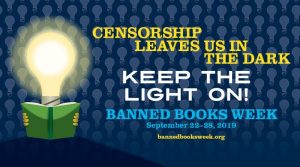Each year, the Ames Library joins the American Library Association, along with “librarians, booksellers, publishers, journalists, teachers, and readers of all types,” in celebrating intellectual freedom and the freedom to read during Banned Books Week.
Founded in 1982, following the Supreme Court’s decision in Island Trees School District v Pico (1982) that “the First Amendment limits the power of junior high and high school officials to remove books from school libraries because of their content,” Banned Books Week reminds us that attempts are made every year to censor books, comics and graphic novels, games, and other media, and that it is our ongoing responsibility as readers, writers, teachers, and content creators to speak out for the right to read freely.
According to the American Library Association, there were at least 347 challenges to library, school, and university library materials or services in 2018, including attempts to limit, censor, or ban access to more than 475 titles, including: The Hate U Give, by Angie Thomas; This One Summer, by Mariko Tamaki; and, Two Boys Kissing, by David Levithan. An introduction to the “Top 11 Most Challenged Books of 2018” is available on YouTube. Additional information on attempts to censor comic books and other graphic media is available through the Comic Book Legal Defense Fund.
The Ames Library, like Illinois Wesleyan University, is committed to the ideal of a liberal education, which depends on one’s ability to read freely and fully, both during one’s education and for a lifetime. Visit the library during the upcoming weeks to see our annual exhibition of “banned books” available to you in the library collection. For an added bonus, visit the Banned Books Week YouTube channel to hear University Librarian Scott Walter read from some of his favorites on “Top 10” lists in past years, including Alison Bechdel’s Fun Home and Sherman Alexie’s The Absolutely True Diary of a Part-Time Indian.
If you would like to include a discussion of intellectual freedom, the freedom to read, or efforts to censor library materials or other content available through libraries, booksellers, television, film, or the internet in your classes, please contact your liaison librarian.

